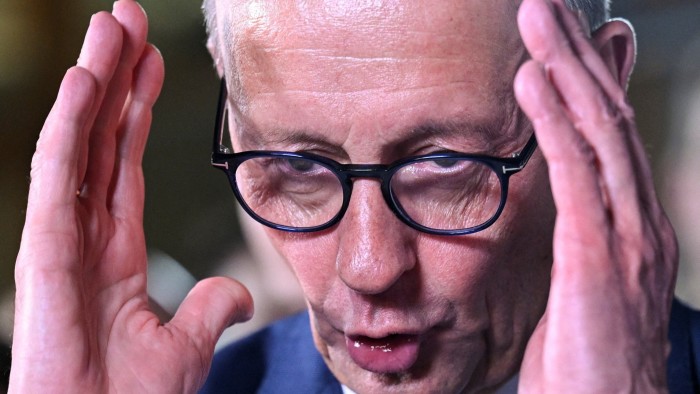Unlock the Editor’s Digest for free
Roula Khalaf, Editor of the FT, selects her favourite stories in this weekly newsletter.
The “world out there will not wait for us”, said Friedrich Merz as he celebrated victory by his Christian Democratic Union (CDU) in Germany’s parliamentary election on Sunday. But wait is exactly what we have to do for a new coalition to take power in Berlin.
After four years of drift and dysfunction, Germany badly needs a stable, effective and ambitious government. Europe is yearning for it too. The foundations of Germany’s postwar success are disintegrating. Open markets are being wrenched shut by US protectionism and Chinese state capitalism. The US security guarantee for Europe is all but over while Russia is a growing threat. And a worryingly large minority in Germany is losing faith in mainstream politics — although an estimated turnout of 84 per cent on Sunday is an impressive testament to Germany’s overall commitment to the democratic process (take note, JD Vance).
Grappling with these enormous problems would be a tall order for any government. But politics in Germany as elsewhere in Europe is increasingly fragmented and polarised. After a bruising campaign, where the mainstream parties often focused their fire on each other, Merz must now show he can be conciliatory, which is not an obvious trait. Although the CDU was the clear winner and can claim the chancellery, it won an estimated 29 per cent of the vote — which apart from the last election in 2021, ranks as the party’s worst result since 1949. Furthermore Merz is considerably less popular than his centre-left predecessor Olaf Scholz was when the Social Democrat took office.
Merz’s easiest option is a grand coalition with the Social Democrats (SPD) — but without Scholz, who has refused to serve under the CDU leader. After nearly four years of failing to lead a bickering coalition with the Greens and liberal Free Democrats, the forever self-satisfied Scholz took his party to its worst defeat in 137 years. A spell in opposition would do the SPD good, but it exists to govern and the alternatives for Merz would be worse.
The CDU and SPD should be able to agree on tax cuts, more public investment, higher defence spending and a clampdown on asylum-seekers. But the talks could be long and tough, not least because Merz has steered his party to the right. He passed a parliamentary motion calling for a drastic immigration crackdown with the support of the far-right Alternative for Germany, while insisting he would never co-operate with it. It won him few votes, as apeing the far-right seldom does, but it burnt trust with the SPD.
A grand coalition deal is feasible. The question is whether it will be more than the lowest common denominator. It is already in effect a three-way tie-up, given the tendency of the CSU, the CDU’s Bavarian sister party, to freelance. If they need the support of the Greens to make a parliamentary majority, the chances of running a coherent, orderly government are slim.
Germany needs to make some radical choices, such as reforming the constitutional debt brake to free up public investment, finding the money for sustained increases in defence spending and agreeing to give the EU more financial firepower. Merz tiptoed around these issues during the campaign. Only in its closing stages (thanks to the Trump administration’s embrace of the AfD) did the contest begin to reflect the vertiginous pace of change in global affairs.
It was on Sunday night, as the votes were being counted, that Merz revealed what could become the defining mission of his chancellorship. His aim, he said, was “to achieve independence” from the US given that the Trump administration was “largely indifferent” to Europe’s fate.
It is a vaulting ambition. It could in theory unite the CDU and SPD in a kind of government of national emergency, especially if the centre-left fell in behind Boris Pistorius, the popular and hawkish defence minister in the outgoing coalition. But the SPD might balk at the sacrifices needed and there is no guarantee of the required two-thirds majority in both houses of parliament to change the debt brake.
Germany’s European partners are desperate for it to act boldly to revive its economy and rearm. Unless it does so, it is not just the EU’s competitiveness and security that will be threatened but its very survival. With the AfD waiting to capitalise on public disillusionment with the established parties’ ability to deliver, another four years of dithering government would end in disaster.
Read the full article here



